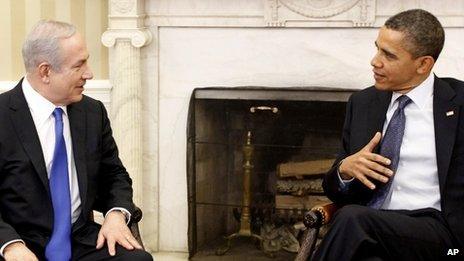Obama and Netanyahu play down differences
- Published
- comments

The two leaders played down their differences in a joint appearance at the White House
The Israeli prime minister and American president sat side by side, faced the cameras and emphasised agreement in their separate monologues.
It was a very deliberate contrast to their last awkward, tetchy meeting, when Benjamin Netanyahu lectured Barack Obama on Israeli and Jewish history.
The two men may not have warm feelings towards each other, but they don't want the embarrassment of a public falling out.
President Obama, again stressing that he "has Israel's back", is well aware of the damage a public spat with Israel could do in an election year.
Mr Netanyahu does not face an election, but there are those at home who don't like his feuding with the US president.
So there was plenty of talk of agreement. The trouble was they stressed different points of agreement, external.
'Controlling our destiny'
President Obama repeated that it was "unacceptable" for Iran to get nuclear weapons, and that he meant it when he said "all options" were on the table.
But that was not his main message. That was about a window of opportunity.
"I know that both the prime minister and I prefer to resolve this diplomatically," Mr Obama said.
"We understand the costs of any military action. And I want to assure both the American people and the Israeli people that we are in constant and close consultation."
The Israeli prime minister, hands splayed on his knees, listened intently, nodding from time to time. For him, the key point was the president's acceptance of Israel's sovereign right to act on its own.
"Israel must have the ability always to defend itself by itself against any threat; and that when it comes to Israel's security, Israel has the right, the sovereign right to make its own decisions," Mr Netanyahu said.
"I believe that's why you appreciate, Mr President, that Israel must reserve the right to defend itself."
"And after all, that's the very purpose of the Jewish state - to restore to the Jewish people control over our destiny. And that's why my supreme responsibility as prime minister of Israel is to ensure that Israel remains the master of its fate," he added.
It was time for the president to nod in agreement.
'Destabilising'
Both men know that a lack of unity can only benefit a common enemy. But the disagreement between them is profound.
In one sense, it boils down to their different red lines - what they will not allow.
President Obama has said Iran must be stopped from "possessing" a nuclear weapon. That probably would not happen for a couple of years.
The Israeli government's red line is apparently when Iran has enough enriched uranium to make a bomb (and when they hide it deep underground). Analysts say the Iranians could achieve that later this year.
One Israeli journalist has written, external that the plan is to drag the US into a war just before the presidential elections in November.
But this is not just about when to go to war. President Obama has stressed his reluctance to go to war at all. The US military feels this even more strongly.
In 2009 US General Anthony Zinni said an attack on Iran would lead to boots on the ground and, "if you like Iraq and Afghanistan, you'll love Iran".
Sources with close links to US intelligence have told the BBC: "After a decade of wars in the extended Middle East, there's not much appetite for another one that directly destabilises the last effort [Iraq] and otherwise stresses an army that's badly in need of reorganisation and repair.
"Until there is clear evidence Iran has decided to work on a bomb - and the intelligence community does not think the decision has been taken - there is no justification for a US military attack. "
The unity on display today is paper-thin, and President Obama's real aim will be to stop Israel talking up the possibility of war.